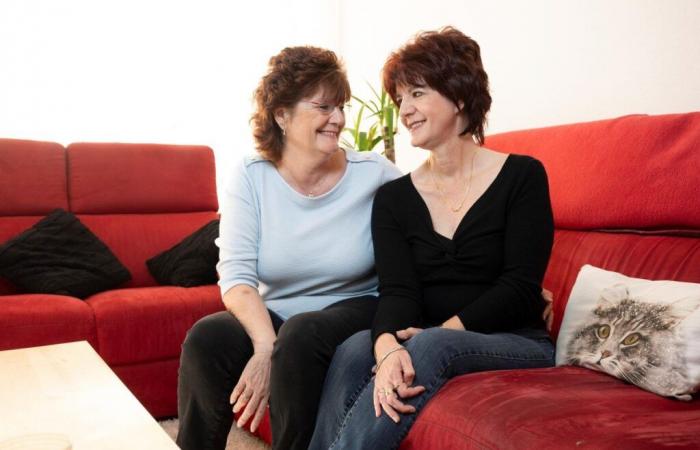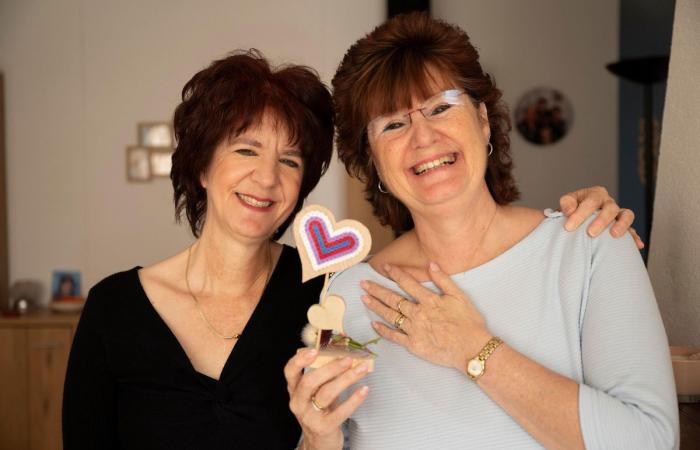Medical adventure –
Dean of heart transplant recipients, she received a kidney from her sister
Marinette Baud has lived with someone else’s heart since 1989. In 2003, her sister Janique gave her a kidney. Their extraordinary history has united them forever.
Maximerutschmann
Published today at 9:25 a.m.
In 2003, Janique Chatenoud (left) donated a kidney to her sister Marinette Baud, who had already had a heart transplant in 1989, at the age of 19. She was one of the first in Switzerland to undergo such an intervention.
Florian Cella/24 hours
Subscribe now and enjoy the audio playback feature.
BotTalk
- Marinette Baud received a heart transplant in 1989, a time when heart transplantation was in its infancy.
- She is now the oldest heart transplant recipient in Switzerland, according to her surgeon at the time.
- Fourteen years later, in 2003, his sister Janique gave him a kidney. An unshakable bond exists between the two sisters.
- The duo lives almost normally with regular medical check-ups.
You have to see them looking at each other, accomplices, joyfully interrupting each other in bursts of laughter and feeling that between them, there are links that nothing could shake. Chatting with Marinette Baud and Janique Chatenoud means understanding that the two sisters are united by an intimate story, a medical adventure like few others.
This story is that of a 19-year-old girl who received a heart transplant in 1989 – making her, thirty-five years later, the oldest heart transplant recipient still alive in Switzerland, according to her first cardiologist – to whom his sister donated a kidney in 2003, to allow him to return to a normal life.
Rare giant cell virus
Spring 1989. Marinette Baud, who grew up in Apples in a farming family, feels her body failing. “The 1is In May, I called the doctor to explain that I felt extremely tired and had difficulty breathing.” Strolled between Morges and Lausanne, the patient remained under observation at the CHUV for six weeks, after the x-rays showed water in her lungs.
His meeting with Marinette Baud, cardiology professor Jean-Jacques Goy remembers it as if it were yesterday. “When she arrived in the Emergency Department, moribund, we said to ourselves that she was going to die! His heart was affected by a type of inflammation called “giant cell myocarditis.” Faced with this exceptional situation, a solution is quickly needed: transplantation.
First steps of heart transplants
But at the time, heart transplants were still in their infancy in Switzerland and only began at the CHUV in 1987. “The only two criteria for accepting a heart were the weight and blood group of the donor and the recipient who should have been the same, continues Jean-Jacques Goy. Despite the risk of rejection, the first ten Lausanne transplant recipients all survived at least five years, we were lucky.”
After her heart, Marinette Baud’s kidneys begin to play tricks on her. His sister Janique, highly compatible, will give him one of hers.
Florian Cella/24 hours
For Marinette Baud, it’s a shock. “I told myself that my life was over! At my age, I didn’t think about organ donation at all.” Fear soon gives way to waiting, long and uncertain. Interrupted on Monday July 10, 1989, when the CHUV announced to him that the operation was scheduled for the following day. It is finally the same afternoon that Marinette Baud will spend on the billiards table, under the hands, in particular, of Professor Hossein Sadeghi, head of cardiac surgery. “It was long,” says Janique Chatenoud, while her sister cannot remember the two and a half hours of the operation, but remembers precisely her waking up the next day, at the time when the clock in her room indicated noon sharp.
From the heart to the kidneys
In the months following the operation, the patient, now 54 years old, learned to live with the heart of another. “At first I felt like it wasn’t beating based on my breathing, because it’s not connected to me in a nervous way. It took me a while to adapt.”
However, nothing stopped her from returning to her position as a saleswoman, before finding a job at the Saint-Prex post office, an office that her sister would also join later. The medical problems of the woman who now lives and works in Orbe could have ended there.
But in the early 2000s, it was his kidneys that began to play tricks on him. And for good reason: cyclosporine – an anti-rejection drug which has enabled the rise of organ transplants – turns out to have side effects. “In the long term, this substance has toxic effects which cause kidney failure in transplant recipients,” explains Marinette Baud’s former cardiologist. Dialyzed four times a day, the thirty-year-old is putting her career on hold.
“It was like lending him 10 francs”
That’s when his sister intervenes. “I immediately said that I could give him a kidney,” says Janique Chatenoud as if it were obvious. For me, it was the same as lending him 10 francs!” Subjected to a battery of physical and psychological examinations, the duo does not give up. “We were together, it was nice,” explains the eldest. We even took a Scrabble to keep us busy!” Result: the analyzes demonstrate a compatibility rate close to that of binoculars.
The hospital corridors once again become Marinette Baud’s second home. Admitted to the CHUV in March 2003, the two sisters describe an operation that was “fairly simple” for the recipient, but “very painful” for the donor. Still, the youngest, whose weight had dropped to 34 kg, considers herself alive again for the second time. Looking back, she admits to having “forgotten a lot of bad times” and prefers to emphasize her sisterly relationship. “Between us, it’s recess every day! And we still have a long way to go side by side.”
Do everything to return to normal life
Marinette Baud and Janique Chatenoud “are aging well”, to use their expression, released in a jokey tone. The woman who underwent a double transplant struggles to remember that her heart operation dates back to 1989 and that she has been living with a transplanted heart for thirty-five years. “His medical career is exceptional,” emphasizes Professor Jean-Jacques Goy. When I see her again, I am always moved and proud, because I tell myself that our efforts saved her life.”
However, the lives of the two sisters are punctuated by medical examinations. “Today, Janique has less risk of death than a person who never gets checked,” insists Marinette Baud. On a daily basis, the duo is required to drink more than two liters of water per day to reduce possible kidney damage. “It’s painful, especially in winter,” laughs the donor, while a pot of hot Earl Gray tea sits on their table. Immunosuppressed since her heart transplant, her sister takes care to avoid falling ill; she who admits to fearing death as much as she loves life. “I’m very careful, I protect myself, but that doesn’t stop me from living normally!”
Did you find an error? Please report it to us.
1 comment







